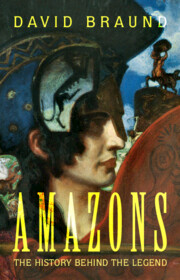Refine search
Actions for selected content:
76 results
The nature of poetry and the proper way of reading it. A modern look at Plutarch’s pedagogical views in ‘How to study poetry’
-
- Journal:
- Journal of Classics Teaching , First View
- Published online by Cambridge University Press:
- 01 December 2025, pp. 1-6
-
- Article
-
- You have access
- Open access
- HTML
- Export citation
1 - Lyric as Literature
- from Part I - Imperial Phenomenology of Lyric
-
- Book:
- Aelius Aristides and the Poetics of Lyric in Imperial Greek Culture
- Published online:
- 01 May 2025
- Print publication:
- 15 May 2025, pp 25-63
-
- Chapter
- Export citation
Epilogue
- from Part II - Aelius Aristides’ Lyric
-
- Book:
- Aelius Aristides and the Poetics of Lyric in Imperial Greek Culture
- Published online:
- 01 May 2025
- Print publication:
- 15 May 2025, pp 270-275
-
- Chapter
- Export citation

Amazons
- The History Behind the Legend
-
- Published online:
- 26 March 2025
- Print publication:
- 24 April 2025
THE SON OF DRACO: ALEXANDER THE GREAT IN THE NOVEL HISTORY OF PTOLEMY THE QUAIL
-
- Journal:
- Greece & Rome / Volume 72 / Issue 1 / April 2025
- Published online by Cambridge University Press:
- 18 March 2025, pp. 65-87
- Print publication:
- April 2025
-
- Article
-
- You have access
- Open access
- HTML
- Export citation
Chapter 1 - Defining the Concepts
- from Part 1 - Paradoxes and What They Do to Us
-
- Book:
- The Meaning of Paradoxes and Paradoxical Thinking
- Published online:
- 04 April 2025
- Print publication:
- 13 March 2025, pp 15-18
-
- Chapter
- Export citation
IV - The Historian’s Deeds
-
- Book:
- Authority and Tradition in Ancient Historiography
- Published online:
- 31 January 2025
- Print publication:
- 06 February 2025, pp 175-216
-
- Chapter
- Export citation
Chapter 6 - The Maiden and the Mirror
- from Part II - Performances of Power
-
-
- Book:
- Place and Performance in Ancient Greece, Rome, and China
- Published online:
- 28 November 2024
- Print publication:
- 05 December 2024, pp 197-238
-
- Chapter
- Export citation
ALEXANDER’S LAST CAROUSE
-
- Journal:
- The Classical Quarterly / Volume 74 / Issue 2 / December 2024
- Published online by Cambridge University Press:
- 04 March 2025, pp. 511-528
- Print publication:
- December 2024
-
- Article
- Export citation
TRAJAN’S NOSE: ANTHOLOGIA PALATINA 11.418 AND PLUTARCH’S REGVM ET IMPERATORVM APOPHTHEGMATA 172E
-
- Journal:
- The Classical Quarterly / Volume 74 / Issue 2 / December 2024
- Published online by Cambridge University Press:
- 21 February 2025, pp. 800-803
- Print publication:
- December 2024
-
- Article
-
- You have access
- Open access
- HTML
- Export citation
Argumentum ad Lunam: Pauline Discourse, “Double Death,” and Competition on the Moon
-
- Journal:
- Harvard Theological Review / Volume 117 / Issue 4 / October 2024
- Published online by Cambridge University Press:
- 31 December 2024, pp. 720-743
- Print publication:
- October 2024
-
- Article
- Export citation
Prologue
-
- Book:
- Hannibal and Scipio
- Published online:
- 05 September 2024
- Print publication:
- 26 September 2024, pp 1-8
-
- Chapter
- Export citation
Chapter 1 - Hannibal and Scipio on Themselves
-
- Book:
- Hannibal and Scipio
- Published online:
- 05 September 2024
- Print publication:
- 26 September 2024, pp 9-40
-
- Chapter
- Export citation
Prologue
-
- Book:
- Hannibal and Scipio
- Published online:
- 05 September 2024
- Print publication:
- 26 September 2024, pp 1-8
-
- Chapter
- Export citation
1 - Ancient Influences on the Essay
- from Part I - Forming the British Essay
-
-
- Book:
- The Cambridge History of the British Essay
- Published online:
- 31 October 2024
- Print publication:
- 04 July 2024, pp 3-17
-
- Chapter
- Export citation
Chapter 13 - Plutarch and the History of Greek Poetry
- from Part III - Narratives of Change
-
-
- Book:
- Writing Literary History in the Greek and Roman World
- Published online:
- 07 June 2024
- Print publication:
- 27 June 2024, pp 282-302
-
- Chapter
- Export citation
Chapter 9 - Epicureans on Preconceptions and Other Concepts
-
-
- Book:
- Conceptualising Concepts in Greek Philosophy
- Published online:
- 25 April 2024
- Print publication:
- 02 May 2024, pp 203-236
-
- Chapter
-
- You have access
- Open access
- HTML
- Export citation
NOTES ON PLUTARCH, ALEXANDER
-
- Journal:
- The Classical Quarterly / Volume 74 / Issue 1 / May 2024
- Published online by Cambridge University Press:
- 29 May 2024, pp. 260-268
- Print publication:
- May 2024
-
- Article
-
- You have access
- Open access
- HTML
- Export citation
Conclusion
-
- Book:
- The Body Politic in Roman Political Thought
- Published online:
- 01 February 2024
- Print publication:
- 08 February 2024, pp 195-204
-
- Chapter
-
- You have access
- Open access
- HTML
- Export citation
Chapter 1 - Reconstructing Empedocles’ On Nature
-
- Book:
- Reconstructing Empedocles' Thought
- Published online:
- 01 February 2024
- Print publication:
- 08 February 2024, pp 24-61
-
- Chapter
- Export citation
